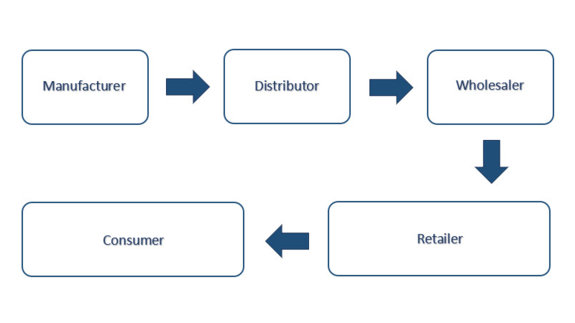Wholesaler
Wholesalers are companies that buy in large quantities and sell by volume. They are the intermediaries between manufacturers and retailers.
Wholesalers do business-to-business sales (B2B) and do not generally sell to private individuals.
Most wholesalers specialize in a particular sector (e.g., plumbing, electrical supplies, auto parts) and sell through retail offices, call centres and online sites.
What’s the difference between manufacturers and retailers?
Manufacturers are at the top of the value chain. They handle production and transform parts or raw materials into finished commodities. They also need to sell their commodities as quickly as possible.
Retailers buy and sell minimum quantities, almost on an individual basis. They are at the bottom of the value chain.
How do wholesalers add value?
Wholesalers add value to the production chain by doing several things:
- liaising with manufacturers when there is no distributor
- providing a wide selection of commodities and services so that buyers can access them all in one place
- increasing the efficiency of their supply chain by ensuring that the products and services that buyers require are available
Wholesalers normally specialize in a sector and sell through retail outlets, call centres and online sites.
Jean-Luc Geha, Professor and Associate Principal of the Sales Institute at HEC Montréal, explains that quantities requested by retailers are often not large enough to enable them to buy directly from manufacturers.
"And what if it’s a manufacturer based in China or Europe? The Chinese manufacturer is not exactly set up to go and deliver to St. Hubert St. in Montreal.”
Wholesalers normally buy large quantities, separate them into smaller units and resell them at a profit. Wholesalers can also handle delivery and distribution between manufacturers and retailers. Geha says this role in the value chain requires a high degree of coordination.
Since wholesalers need to earn a fee for their work, the prices they charge will be higher than those of the manufacturer. In fact, manufacturers are often not equipped to serve large numbers of customers.
Are distributors wholesalers?
The terms “distributor” and “wholesaler” are often used interchangeably.
Geha says the distinction is sometimes made over territory, where distributors obtain exclusive sales rights for a geographical area.
The value chain is commonly divided in the following way:

Can a company be both a wholesaler and a retailer?
A company can be both a wholesaler and retailer, says Geha. “However, these are often two different entities within the same company.”
Take a large grocery chain, for example. It can have its own wholesaler, which will often be part of the same company. The chain’s supermarkets will buy their commodities from the chain’s wholesaler, enabling them to get better prices than they would have from independent wholesalers. This also enables the chain to offer greater product consistency.
The challenges facing wholesalers
Wholesalers make money by buying commodities at a certain price, then reselling them at a slightly higher price. “Their challenge is, above all, to make the distribution chain efficient and cost-effective enough to attract more customers,” says Geha, adding that this takes place in a market with lots of competition and powerful brands. So it’s often the price that sets them apart.
Another challenge for wholesalers is the need for a high degree of coordination. It’s hard for an entrepreneur to suddenly become a wholesaler and find their place in a distribution chain.
Moreover, wholesalers don’t always have the upper hand in the distribution chain.
“For example,” says Geha, “a company buying very large volumes may ask its suppliers to deliver 100,000 pencils the next morning. If a wholesaler says it can’t, it could simply move on to another one.”
Next step
Evaluate various distribution channels and find the optimal ways to move your products by downloading our free distribution channel selection tool.